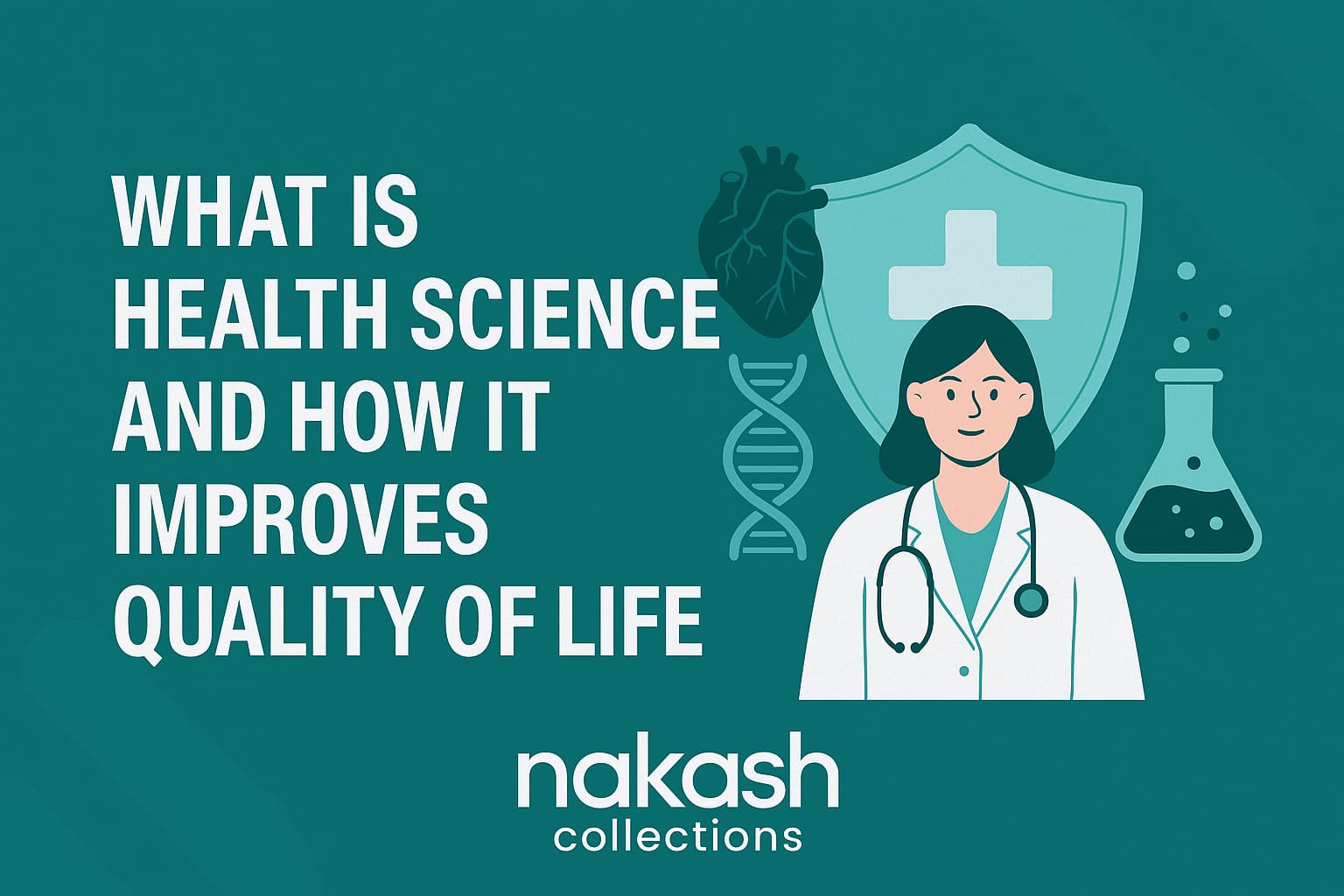Understanding What Health Science Really Means
If you’ve ever wondered what is health science, you’re not alone. Health science is a broad, multidisciplinary field that studies how the human body works and how to improve well-being through prevention, treatment, and research. In essence, it bridges the gap between medical knowledge, technology, and practical healthcare delivery.
Health science covers everything from biology and nutrition to psychology, public health, and clinical medicine. According to the World Health Organization (WHO), more than 50% of global health improvements since the 1950s are attributed to advancements in public health science, like vaccinations, sanitation, and disease control.
This field doesn’t just treat illness, it aims to promote a healthier society by understanding how lifestyle, environment, and genetics influence human health. Whether it’s developing new drugs, improving healthcare systems, or studying the impact of diet on chronic disease, health science plays a vital role in modern life.
The Major Branches of Health Science
When exploring what is health science, it’s important to recognize that it’s not a single discipline. It’s an umbrella term encompassing numerous subfields that each contribute to human health. Some of the key branches include:
- Biomedical Science – Focuses on understanding diseases at the cellular and molecular level.
- Public Health – Involves community-wide health promotion, epidemiology, and policy development.
- Clinical Medicine – Applies scientific knowledge to diagnose and treat patients.
- Nutrition Science – Studies how food impacts body functions and disease prevention.
- Allied Health Professions – Includes roles like physiotherapy, occupational therapy, and medical imaging.
According to the U.S. Bureau of Labor Statistics (BLS), employment in healthcare and health science-related occupations is projected to grow by 13% between 2022 and 2032, adding more than 2 million new jobs. This growth highlights how integral health science is to both public welfare and the economy.
The Role of Research and Technology in Health Science
Modern health science relies heavily on innovation and evidence-based research. Advances like AI diagnostics, telemedicine, and genetic sequencing are transforming how healthcare professionals diagnose and treat patients.
For example, wearable technology, such as smartwatches that track heart rate and oxygen levels, has empowered individuals to monitor their own health in real time. According to a 2023 Statista report, over 250 million wearable health devices are currently in use worldwide.
By integrating data analytics and machine learning, health science research helps identify disease trends earlier, enabling proactive intervention. These breakthroughs also make healthcare more personalized, focusing on prevention rather than just treatment.
How Health Science Improves Quality of Life
Understanding what is health science is key to realizing how it enhances life quality across all age groups. Here’s how it contributes directly:
- Disease Prevention and Management – Vaccination programs and health education campaigns reduce disease prevalence.
- Improved Longevity – Life expectancy worldwide has increased from 47 years in 1950 to over 73 years in 2023 (WHO data).
- Enhanced Nutrition and Fitness – Nutrition science promotes balanced diets that prevent obesity, diabetes, and cardiovascular diseases.
- Mental Health Awareness – Psychology and behavioral science help address anxiety, stress, and depression effectively.
- Public Safety and Environmental Health – Clean air, safe water, and sanitation, key outcomes of health science, prevent millions of deaths annually.
Each of these improvements shows how science-based approaches help societies thrive physically, mentally, and socially.
Education and Career Opportunities in Health Science

The question what is health science often leads students to explore rewarding careers. A degree in this field opens doors to diverse professions such as:
- Medical Laboratory Technologist
- Public Health Educator
- Healthcare Administrator
- Biomedical Researcher
- Nutritionist or Dietitian
- Physical or Occupational Therapist
According to Indeed and LinkedIn data (2024), health science graduates earn an average annual salary ranging from $55,000 to $95,000, depending on specialization and experience. Moreover, with the global healthcare sector valued at over $10 trillion, demand for skilled professionals continues to rise.
Educational programs often include courses in anatomy, physiology, biostatistics, epidemiology, and health informatics, each reinforcing the scientific foundation behind patient care and health promotion.
Public Health Science and Global Impact
One of the most transformative aspects of health science is its contribution to public health worldwide. During the COVID-19 pandemic, for example, the collaboration between scientists, healthcare workers, and policymakers demonstrated how critical health science is in protecting populations.
Public health science focuses on disease surveillance, vaccination programs, sanitation initiatives, and policy development. As per CDC and WHO reports, vaccination campaigns prevent about 3 million deaths annually from diseases such as measles, polio, and diphtheria.
This global collaboration underlines how understanding what is health science goes beyond labs and hospitals, it’s about improving life expectancy, reducing inequality, and ensuring access to care for all.
How Nutrition and Lifestyle Research Fit into Health Science
Health science isn’t just about medicine; it’s about holistic wellness. Research consistently shows that 70–80% of chronic diseases can be prevented through healthy lifestyle choices.
Studies published in The Lancet (2023) found that balanced nutrition and regular exercise reduce the risk of heart disease by up to 50%. This reinforces the link between health science and everyday habits.
Dietitians, exercise physiologists, and wellness coaches use scientific findings to design personalized plans that promote long-term health. Whether it’s understanding macronutrient balance or optimizing sleep patterns, these professionals rely on the same core principles that define what is health science.
The Future of Health Science: Where Innovation Meets Humanity
The future of health science is deeply intertwined with technology, sustainability, and human ethics. Emerging fields like genomic medicine, digital health, and precision therapy are reshaping healthcare’s next frontier.
AI algorithms can now analyze thousands of medical images in seconds, identifying early signs of cancer that human eyes might miss. Similarly, nanotechnology is being used to deliver drugs directly to cancer cells, reducing side effects and improving treatment outcomes.
However, the goal of health science remains human-centered: using data and discovery to enhance the quality of life. Whether it’s fighting global pandemics, addressing mental health crises, or tackling climate-related health issues, health science continues to evolve in ways that put people first.
Click nakash.signaturehome.online to read more health blogs.
Final Thoughts
When we ask what is health science, we uncover more than a field of study, we reveal the foundation of global well-being. It’s a discipline that combines human compassion with scientific innovation, striving to make life longer, healthier, and more fulfilling for all.
From disease prevention and mental health care to medical technology and nutrition, health science continues to shape the way we live. Its contributions remind us that health is not merely the absence of illness, but the presence of vitality, purpose, and balance.
FAQs About Health Science
1. What is health science in simple terms?
Health science is the study of how to improve human health through research, technology, and healthcare practice. It combines biology, medicine, and social science to enhance quality of life.
2. What careers can I pursue with a degree in health science?
You can work in clinical settings, research labs, public health agencies, or the healthcare industry as a nurse, therapist, scientist, educator, or administrator.
3. How does health science benefit society?
It improves life expectancy, prevents diseases, reduces healthcare costs, and enhances mental and physical well-being through education, innovation, and healthcare delivery.
4. Why is research important in health science?
Research provides evidence-based insights that shape medical treatments, public health policies, and healthcare technologies.
5. What’s the difference between health science and medicine?
Medicine focuses on diagnosing and treating individual patients, while health science covers a broader spectrum, research, prevention, and population health.
References
- World Health Organization (WHO) – Global Health Observatory
- U.S. Bureau of Labor Statistics – Healthcare Occupations Outlook 2022–2032
- Centers for Disease Control and Prevention (CDC) – Vaccination Impact Reports
- Statista – Wearable Health Device Statistics 2023
- The Lancet (2023) – Global Burden of Disease Study
- Indeed & LinkedIn Data Reports (2024) – Healthcare Salary Insights



